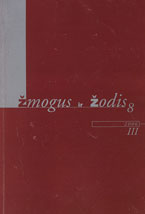Vergangenheitstempora im Deutschen und im Litauischen Semantisch-pragmatischer Aspekt
Past Tense-Aspect Forms in the German and Lithuanian Languages: a Semantic-Pragmatic Aspect
Author(s): Ernesta RačienėSubject(s): Language and Literature Studies
Published by: Vytauto Didžiojo Universitetas
Keywords: Past (non-frequentativ); Past Frequentativ; Present Perfekt; Past Perfekt; Future Perfekt; compound perfekt tenses; compound continuative/imperfect tenses.
Summary/Abstract: The article is an analysis and comparison of peculiarities related to meanings and usage of grammatical, present tense-aspect forms in the German and Lithuanian languages. There exist quantitative differences between tense categories in German and Lithuanian: the German language has six tense-aspect forms; meanwhile, the Lithuanian tense system consists of eleven forms. In the semantic aspect, the tense systems of the languages compared are not radically different, and we have detected the majority of differences among past tense-aspect forms. The semantic-pragmatic aspect allows clarifying similarities and differences between past tense systems of the aforementioned languages, as well as to determine functional equivalents.
Journal: Žmogus ir žodis
- Issue Year: 08/2006
- Issue No: 3
- Page Range: 46-51
- Page Count: 6
- Language: German

